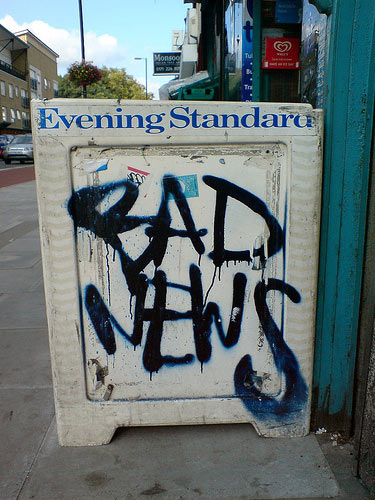How is any of this good news? We’ve finally hit the tipping point where things can actually start to change.
Reality is Peeping Through the Propaganda . . .
The average American, and many not-so-average ones, have not been aware of how very limited our success in treatment of mental illness has been. We’re barraged with ads for antidepressants and for add-ons if one’s antidepressants aren’t working so well. We see laws proposed to force psychiatric drugs on unwilling patients who do not meet legal requirements for incompetency and who are legally allowed to make all other medical decisions for themselves. We’ve got scores of drugs for psych problems of all kinds. The public has been led to believe that if people are still disabled and dying it must be because they can’t afford the drugs, they’re too stubborn or too delusional to recognize that the drugs would fix their problem, or they’re too ashamed to admit that they have a problem. What does Larry Davidson, Professor of Psychiatry at Yale say?
For most people, medications do not eliminate the illness but only lessen some of its more intrusive features. At the same time, side effects are not merely unpleasant or annoying. They may make it difficult for people to function at all and may contribute to the loss of fully a third of the person's expected lifespan [Hartford Courant, "Mental Illness Fallacies Counterproductive," April 26, 2013]
No Fewer are Dying of Suicide . . .
Despite the fact that many drugs have been approved for treatment of depression, anxiety, OCD, bipolar disorder, schizophrenia, etc., over the last 30ish years, the number of suicides has not declined in that time, while deaths due to heart disease, leukemia, and stroke have dropped dramatically in the same time. (from the NIMH Director’s slides in his January 2013 TED talk**)We Still Do Not Know What We’re Treating . . .
It would seem with all the brain scan pictures we’ve seen in the media that we can “see” schizophrenia, depression, bipolar, PTSD, etc., but it’s not true. There is no test or scan a doctor can use to determine which, if any, of those labels apply to a patient. And, BTW, they’re just labels, not specific illnesses. Because medical science is still quite ignorant of what causes these illnesses and how their symptoms are produced the labels are rough guesses which probably include different illnesses under one label, much like lumping TB, bronchitis, lung cancer, and pneumonia together because they cause chest congestion and cough. NIMH Director Insel: said, "DSM ... is, at best, a dictionary, creating a set of labels and defining each. . . . The weakness is its lack of validity." and "Patients with mental disorders deserve better.”***It’s Time We Found Out the Real Causes . . .
And that’s where things are heading. Obama is funding a mind mapping program, the human biome project is already underway, and the NIMH is moving away from research based around current diagnostic labels. In years to come this research will allow us to understand how and why the brain develops harmful symptoms and from there we can begin to figure out how best to treat the problems.And Stop Looking for Answers Only Where the Money Is
The same treatment my grandmother got half a century ago is still the treatment of choice for bipolar disorder today. I’m hoping my five grandchildren will become adults in a world where we have made much more progress. The vast majority of the research in the last half century has been done by drug companies, by universities funded by drug companies, and by scientists/doctors funded by drug companies. Guess what type of answers they tend to come up with? There’s no reason to believe that the best way to restore someone to a mentally healthy state must be a drug. Drug research is fine, but to focus on it alone is an example of the old “looking for keys under streetlight” story where a drunk tells the cop he’s looking there because the light’s better, even though he doesn't know if that’s where he lost the keys.* Dr Thomas Insel, Director NIMH, from his blog (http://www.nimh.nih.gov/about/director/2012/balancing-immediate-needs-with-future-innovation.shtml) “current treatments are not effective enough. While there have been important innovations in the behavioral treatment of borderline personality disorder and family interventions for anorexia nervosa, for many disorders we have little to show after four decades of pharmacologic research except reduced medication side-effects. In spite of exuberant sales of medications and broader use of psychosocial treatments, we are faced with outcomes that are just as unacceptable for serious mental disorders as they would be for cancer. Briefly stated: in many cases patients receiving the best of current care are not recovering. We can blame the mental health care system, the absence of insurance or providers, or stigma, but the inconvenient truth is that our treatments are not good enough. NIMH has a critical role for ensuring that more effective medications, devices, and psychosocial treatments are available in the future.
**http://www.ted.com/talks/thomas_insel_toward_a_new_understanding_of_mental_illness.html
***http://www.nimh.nih.gov/about/director/2013/transforming-diagnosis.shtml
Photo credit: cakehole

Yup, you've pretty much nailed it. Though in defense of DSM-V (and as a rule, you don't find me singing the DSM's praises), the attack for lack of scientific basis is on the whole DSM paradigm, not just this new edition. It had the misfortune to come along at the point when the critique has finally reached the turning point.
ReplyDeleteWe're in complete agreement. Note that I didn't specify DSM 5. Thanks for the comment, Willa!
ReplyDelete